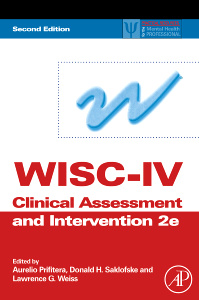WISC-IV Clinical Assessment and Intervention (2nd Ed.) Practical Resources for the Mental Health Professional Series
Coordonnateurs : Prifitera Aurelio, Saklofske Donald H., Weiss Lawrence G.

1. Interpretation and Intervention with WISC-IV in the Clinical Assessment Context
Part 2 Interfacing WISC-IV Assessment and Intervention: Clinical Applications
2. Research-Supported Differential Diagnosis of Specific Learning Disabilities and Implications for Instruction and
3. WISC-IV Interpretation for Specific Learning Disabilities Identification and Intervention: A Cognitive Hypothesis Testing Approach
4. Language Disabilities
5. Attention-Deficit/Hyperactivity Disorder: Using the WISC-IV to Inform Intervention Planning
6. The Use of the WISC-IV in Assessment and Intervention Planning for Children Who are Gifted
7. Assessment of Mental Retardation/Intellectual Disability with the WISC-IV
8. Autism Spectrum Disorders: WISC-IV Applications for Clinical Assessment and Intervention
9. Assessment of Children with Emotional Disturbance Using the WISC-IV
10. The Cognitive Impact of Systemic Illness in Childhood and Adolescence
11. Considerations in Using the WISC-IV with Hispanic Children
Part 3 Interfacing WISC-IV Assessment and Intervention: Some Further Considerations
12. Neuropsychological Applications of the WISC-IV and WISC-IV Integrated
13. Extending the WISC-IV: Executive Functioning
14. Cultural Issues in Clinical Use of the WISC-IV
15. Of What Value is Intelligence?
Lawrence G. Weiss, PhD is Vice President of Test Development for Pearson Clinical Assessment. He oversees a department of 150 professionals and is responsible for all research and test development activities related to the company’s psychological, educational, speech, language, and occupational therapy assessment products as well as post college admissions tests. He also advises on test development activities for the company’s international business partners around the globe including Pearson Clinical Assessment offices in the United Kingdom, Australia, Canada, France, Germany, The Netherlands, India, China, Spain, and Brazil.
Dr. Weiss has presented widely on intelligence in more than a dozen countries. He has authored or co-authored the following 7 graduate level text books:
• WISC-III Cross Cultural Analyses: Culture and Children’s Intelligence (2003)
• WISC-IV Clinical Use and Interpretation (2005)
• WISC-IV Advanced Clinical Interpretation (2006)
• WISC-IV Clinical Use and Intervention (2008)
• WAIS-IV Clinical Use and Interpretation (2010)
• BAYLEY-III Clinical Use and Interpretation (2010)
• Advanced Clinical Assessment with WAIS-IV and WMS-IV (2013)
Some of his books have been translated into Spanish, Japanese, and Korean. In addition, he has authored or coauthored approximately 30 journal articles, 12 technical reports, and 10 ot
- Inclusion of case studies illustrating the clinical applications of the WISC-IV in assessment and program planning
- Intervention recommendations following from assessment to diagnosis
- Introductory chapter illustrating the relationships between the WISC-IV index scores and intervention planning
- New chapters on Learning Disabilities, emotionally disturbed children, systematic illness, and Autism Spectrum Disorders
- Specialized chapters on neuropsychological applications, executive functioning, and cultural issues
- Additional information to aid test interpretation including extended norms for gifted children and the Cognitive Proficiency Index
- All chapters revised to reflect data obtained from the test in clinical use
Date de parution : 08-2008
Ouvrage de 600 p.
15x22.8 cm
Épuisé



